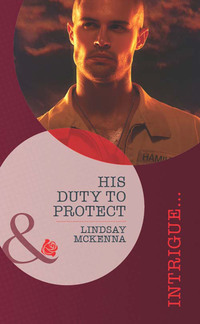
Полная версия
An Honorable Woman
“I know it does,” Maya said gently. Giving her a brief smile, she looked down at a red-and-white-striped folder labeled Top Secret. Picking it up, she handed the folder across the desk to Cam. “Here’s your mission. Everything you’ll need to know.”
Feeling like an exuberant puppy, Cam laid the file in her lap and opened it with trembling hands. Immediately the text blurred before her eyes, and she self-consciously wiped away the tears. She didn’t dare cry in front of Maya. Not now. Cam had to show her C.O. that she was up for this assignment, no matter what it entailed.
“This mission is going to be the hardest one you’ve ever said yes to,” Maya warned in a dark tone. “Let’s go to the briefing room. Morgan Trayhern is waiting to talk to you about it.”
Chapter 2
“Cam, I want you to meet Morgan Trayhern. He owns Perseus, a top secret company that interfaces with the CIA and many other agencies around the world.”
Cam smiled and gripped Morgan’s hand. “Mr. Trayhern, this is an honor,” she said, meeting his warm blue gaze and his smile. Morgan Trayhern was a living legend. He had been a marine captain in the closing days of the Vietnam War. Since then, he had risen to heady heights within the secret, black operations world by his success with his covert agency, which provided much-needed assistance to democratic countries all over the world. He had a knack for employing some of the best men and women from the military as mercenaries to help people in trouble. And now Cam was gripping his firm, powerful hand. She was giddy with excitement.
“It’s a pleasure to meet you, Cam,” Morgan said, releasing her hand. “And congratulations on being chosen for this mission. Have a seat.” He gestured toward a row of chairs that faced a blank white wall.
“Yes, sir.”
Maya sat next to Cam. She handed her a folder that had been sitting on the table in front of them. “You’ll need this, too. Morgan? You ready?”
“Yep.” Moving to one end of the table, he flipped open a laptop computer and pushed a button. The wall became a viewing screen for a slide presentation.
Cam’s heart raced with excitement. She had gotten the mission! She’d been chosen! Joy warred with anxiety within her chest. More than anything, she wanted to prove that she was worthy of her C.O.’s belief and trust in her. Compressing her lips, she listened as Morgan’s low, deep voice filled the small room.
“Major Stevenson has given you two files,” he said. “The first is an overview of the mission. The second has photos, biographies and fitness reports of the three Apache pilots you’re going to be responsible for training in interdiction in northern Mexico.”
“Mexico?” Cam said, looking at Maya.
“Yeah, northern Mexico,” she repeated with a smile. “Right on the border with California. Lucky you. Maybe when things iron out, you can head to San Diego and kick up your heels. Do a little partying in your spare time.” Maya knew that many of the BJS pilots longed to go back to the U.S. from time to time. Living in the humid Peruvian jungle year in and year out, in constant combat mode, took a heavy toll on each of them. Maya started to enforce a thirty-day vacation for her pilots each year so they wouldn’t get too homesick. Three years of duty with no downtime wasn’t good.
Looking at Cam’s face, lit up now with a glow of pleasure, Maya smiled. “And your home state of Oregon isn’t that far from there,” she added, reading her mind.
“I know!” Cam exclaimed happily. She gripped the open folder on her lap. “It’s real close!”
“Well, first things first. Congratulations, you’re going to be the commanding officer of this mission, so who knows? When things are quiet, you might put one of your other pilots—your executive officer probably—in charge, and you can take off for a weekend and visit your family in Oregon. Anything is possible once you get this mission on track.”
Morgan smiled. “Major Stevenson, who is used to commanding, makes this sound easy, Cam. Leading is the hardest work you’ll ever learn how to do.”
“Yes, sir,” Cam said, looking at him. Morgan was tall and broad-shouldered. He wore civilian clothes—charcoal-gray slacks, hiking boots, a red polo shirt. His black hair was cut military short, the silver at his temples lending his handsome face a frame for those lively blue eyes that didn’t miss a thing. She smiled at him as he cocked his head and gazed at her almost as if he were looking through her. Ordinarily, Cam would have felt invaded, uncomfortable, but she didn’t now. Maya had that same ability, and Cam never felt threatened by it, either. Maybe good leaders had that quality of being able to look into the heart and mind of their people in a nurturing way, to see what they were made of.
“You said ‘commanding officer’?” Cam asked in surprise.
“Yes, that’s you,” Morgan murmured with a smile. He pressed a button on the laptop. “You may recognize this place. It’s Tijuana, Mexico—a huge, sprawling city on the U.S. border, right across from San Diego. This is where you’re going.” He pressed the button again.
“There’s a small Mexican Air Force base just beyond the southern outskirts of Tijuana. Two Apache Longbow helicopters are going to be flown in from the States for your use. Your mission, Cam, is to be C.O. for a small contingent of Mexican helicopter pilots who are just now graduating from flight school at Fort Rucker.”
Her brows rose in surprise, but she tamped down her desire to ask questions.
“Two of the three pilots are Mexican nationals. The third—” Morgan pressed the button “—has dual citizenship, from the USA and Mexico. He’s Chief Warrant Officer Gustavo Phillipe Morales.”
Cam looked up as a color slide flashed across the wall. The man who stared back at her made her heart thump hard. About six feet tall, medium-boned and athletic, he was dressed in a dark green, one-piece army flight uniform. Looking deadly serious, he stood in front of an olive-green Apache helicopter, his helmet dangling loosely from his long, tanned fingers.
Gulping, Cam quickly perused the man’s photo. There was something arresting, beckoning and frightening about him, all at the same time. His face was square, his jaw set and his mouth thinned into a hard, single line. Thick, straight brows sat over his cinnamon-colored eyes. It was his eyes, with their huge black pupils, that drew Cam the most. The eyes of a predator. But then, she reminded herself, all gunship pilots had to have that “look.” If they didn’t, they weren’t going to cut it in combat. Morales’s eyes had that gleam of a hunter looking for its prey.
Her pulse raced momentarily. His black hair was cut short, with a few rebellious straight strands dipping over his broad, unwrinkled brow. With his high cheekbones and hawklike nose, he definitely had the face of an Indian, and he reminded Cam of an Incan god she had seen carved in stone on some ancient frieze somewhere. Gustavo Morales had sharp angles and rough edges, giving Cam the impression that he’d been around the block and taken a lot of beatings, but learned from each experience. She saw confidence and pride radiating from him. Just the way Morales stood, with one hand propped on his narrow hip, his helmet in the other, spoke of his certainty about himself and his abilities.
“Warrant Morales,” Morgan intoned, “is U.S. Army, Cam. Though his mother was Yaqui Indian, from northern Mexico, his father is a colonel in the U.S. Army, currently stationed in Afghanistan with a top secret contingent of Apache pilots working behind the lines to hunt down the Taliban.”
“They’re over there?”
Morgan nodded grimly. “Yes. But that piece of info goes nowhere.”
“Of course not, sir.”
“You should consider Morales as executive officer material, Cam. He’s twenty-five years old, and he’s been in the army for four years. He’s an ace helo pilot—he grew up flying with his dad. He speaks Spanish as fluently as you do. I believe, as does Major Stevenson, that he’ll be a key player in making this mission work, even though you’re in charge.”
“How so, sir?”
“Let’s put it delicately, Cam,” Morgan said, giving her a droll look. “The other two officers, both lieutenants with the Mexican Air Force, are…well, for lack of a better word, somewhat biased about women having a lead role. In the Mexican military, there are no women combat pilots.”
“These two Mexican pilots are supposed to be the cream of the crop,” Maya added. “At least, that’s what their general is telling us.”
Morgan pressed the button and their pictures were projected on the wall.
“Lieutenants Antonio Zaragoza and Luis Dominguez did okay at Fort Rucker and learned to fly the Apache,” Maya assured her.
“But,” Morgan warned, “these men come from a country where most women are still kept barefoot and pregnant. The only way they relate to females is as mothers and lovers.”
“Yeah,” Maya growled. “So you’ve got your work cut out for you, Cam. These two dudes are not going to want to accept you as C.O. or even listen to your wise counsel, no matter how much more experienced you are as a combat pilot.”
“I see….” Cam murmured. “And Warrant Morales? He’s been raised in a gender-neutral environment, where women are accepted in leadership roles?”
“Yes,” Morgan said. “Which is one of the many reasons Chief Morales was chosen for this duty. He isn’t aware of why he was chosen. He’ll find that out from you once you arrive at the base in Tijuana.”
“Yaqui Indians,” Maya told her, “have a matriarchal society, and women are considered equal to men. Morales has been steeped in a tradition where women are accepted as being just as strong, smart and effective as any male.”
“That’s good,” Cam said, relieved.
“You’re going to have your hands full,” Morgan warned her gravely. “These are green students who have just learned the basics of day and night flying techniques. They know nothing of interdiction duties, especially in the dark. That’s where you come in. We want you to build a schooling program around them, starting with day flights, and then working in night operations. We all know night flying is more dangerous, but unfortunately, the president of Mexico does not want Apaches flying around where people can see them. He’s afraid it will scare the populace.”
“So,” Maya said, pointing to the screen as a picture of high-desert terrain was shown, “during the day, you’re going to fly your boys into the hills along the Baja coastline and out over the Pacific. There’re plenty of mountains and hills for you to play hide ‘n seek in, to train them on the finer points of interdiction.”
“And then you’ll train them in on night interdiction, once they’ve got the basics and you’re confident of their skills,” Morgan said.
“So bottom line, I’m running an advanced interdiction flight school.”
“Yes,” Morgan said. “You’re going to create that template. And if you’re successful, we’ll take on other Mexican Air Force pilots, train them at Fort Rucker and then get them flying interdiction in their own country, instead of U.S. pilots always putting their lives on the line to do it.”
“Sounds like a good plan to me,” Cam said. She was in awe that they’d choose her for such a mission. Still, fear threaded through her. Could she do it? She would have to. Never had Cam wanted anything more than this. It was a plum—a huge one. And if she was successful, Maya would surely forgive her past error….
Her C.O. was watching her with an assessing expression on her face, Cam noted. “It’s a wonderful opportunity,” Maya said, “but I think this is going to be the roughest mission you’ve ever agreed to, Cam. Those Mexican pilots aren’t going to sit still for your mother hen ways.” She smiled slightly. “You’re a nester, a nurturer by nature, Cam—you appear so warm and easygoing, even though inside there’s a jaguar. You’re just as competitive and cool as any of the other women pilots who fly the Apache, but you come across as soft. You can’t let that happen on this mission. Those pilots see soft and they’ll eat you alive.”
Nodding, Cam gulped and said, “I understand.”
“Down here,” Maya said, “we love your mother hen ways. You’re the one who makes chicken soup if one of us gets a cold or the flu. You’re the one who sits down and listens when someone has a problem and needs to talk it out. You have a natural instinct for caring for others.”
“Those are all good attributes in a leader,” Morgan said quietly. “But you lack the management skills, the firmness and decisiveness setting required in a leader. But you can develop those abilities.”
Nodding, Cam said, “I understand, sir. I’ll do my best to learn to be tough.”
“Well,” Maya said, cocking an eyebrow, “you won’t have much time or space to do it in, Cam. I’m hoping Morales will like you, side with you and act as a natural buffer between you and those two dudes who are going to rain hell on your head every day.” Her mouth quirked. “I’ve experienced more than my fair share of those redneck, good-ole-boy attitudes in the past. I don’t look forward to you cutting your teeth on them, but under the circumstances, they are the cloth we have to work with. That’s the way it is.”
“I’ll handle it, Maya. I swear I will.”
“Oh,” Morgan said, chuckling, “you’ll be swearing, all right. Apache pilots aren’t the tamest people to begin with. They’re edgy, alert, tense and combative by nature. We’re all hoping that Chief Morales will be the great leveler here between you and the others.”
“Because,” Maya predicted grimly, “if he isn’t, it’s going to be three to one—them against you—and this mission could grind to a halt in a hurry.”
“I won’t let it happen,” Cam promised fervently. She gave them a grateful look. “I know it’s going to be a challenge. But I know I can do it. Just let me have the chance….”
“You’ve got the chance,” Morgan murmured. He flipped off the projection program and shut down the laptop. Walking to the other end of the table, he picked up an object and handed it to Cam.
“This is going to be your most precious possession, Cam. It’s an iridium satellite cell phone. There are sixteen satellites circling the globe, and this phone is hooked up to them. You can call from anywhere in the world and reach someone at the other end.”
Cam examined the slender but heavy device. “Okay…”
Maya got up. “The iridium is a very expensive toy, but one you’re going to need.”
Cam looked up in confusion as Maya came and stood in front of her, with Morgan at her shoulder. “Why?”
“Because if you need help, you can call Morgan or myself. We suspect you’re going to need advice from time to time, and with that phone you can reach us.”
“Good leaders ask for help when they get their backs to the wall,” Morgan told her. “Good leaders are forged in the fires of hell, they aren’t born. You’ve not had the privilege of college level management courses, Cam. We’re throwing you into this mission without any background education. Being a good pilot is one thing. Being a leader is a whole other ball game.”
Nodding, Cam murmured, “I realize that from talking to Akiva.”
Maya smiled. “Yes, Akiva became C.O. of a covert black ops base on the Gulf of Mexico, and she found out about it the hard way, too.”
“She did it, though,” Cam said firmly. “And so will I.” She held up the phone and said, “I’ll be calling often.”
Grinning, Morgan patted Cam’s shoulder. “Excellent. That’s what we want to hear. No one knows everything. If I don’t miss my guess, Morales will be your ace in the hole. Use his knowledge and listen to him, too. Take what he says under consideration.”
“Cam’s a good listener. She always has been,” Maya murmured.
“We’re throwing you to the wolves,” Morgan said worriedly. “You’re a helluva good Apache pilot, Cam. You’re the best. The Black Jaguar Squadron has more time in grade in drug interdiction efforts than any other aviation group in history. That’s why you’re being chosen to run this mission—because of your three years of hard-earned experience.”
“She’s still alive. That says it all.”
Cam grinned up at Maya. “Yes, ma’am, you taught us well.”
“Take that training up north, Cam, and use it to help educate these pilots.”
“I will,” she promised, a catch in her voice.
“I only hope,” Morgan said, “that when you meet these macho Mexican pilots, they don’t think you’re breakfast, to be eaten alive.”
Rising, Cam grinned. “Mr. Trayhern, I may look like a cream puff, but in here—” she pointed to her heart “—I’m a black jaguar. They just don’t know it yet.”
Chapter 3
“I can’t believe they’re sending a woman to teach us,” Lieutenant Antonio Zaragoza muttered, his long legs stretched out in front of the door to the barracks room where they waited for their C.O. to arrive.
Gus Morales, who stood at the window, peering through the venetian blinds, glanced over his shoulder at his schoolmate, who sulked like a petulant child. Zaragoza was five foot nine inches tall, only average height for a helo pilot. He made up for his lack of stature by being arrogant and brazen. Lifting his mouth in the ghost of a smile, Gus said, “I think it’s ironic.”
Lieutenant Luis Dominguez, who sat at the table smoking a cigarette, twisted to look in Morales’s direction. “I think it stinks.” He flipped ashes into the ashtray in front of him.
Chuckling, Gus looked at the two Mexican Air Force pilots, who, like him, were dressed in dark green, single-piece flight uniforms. Each of them had the Mexican flag sewn onto his right shoulder. On his own uniform, Gus had the American flag, reflecting the fact that he was in the U.S. Army.
“They want us to fail,” Zaragoza said flatly, his black brows dipping, his arms wrapped across his chest in defiance. Staring down at his highly polished black flight boots, which blocked the entranceway, he glowered. “Women have nothing to teach men!”
“Sí,” Luis agreed. “Their place is in bed, with us.”
“Yes, they are good for pleasure,” Antonio stated darkly. “But not as Apache instructor pilots, teaching us the finer points of drug flight interdiction.”
“Where I come from,” Gus told them lightly, a cockeyed grin on his face, “women are not only teachers, but equals. I guess you two need to square away your attitudes on that one. Otherwise, you won’t learn a thing from Chief Anderson.”
Snorting vehemently, Luis took a deep drag of his cigarette, then blew the smoke out—an eloquent, if silent, reply.
Gus turned and looked out the window again. He and the others were on the second floor of the barracks, waiting for their new commanding officer, C.R. Anderson. They’d been informed she was an Apache gunship pilot who had been on duty in Peru for three years, flying drug interdiction on a black ops combat mission. That’s all they knew. He was curious. And anxious to learn what she knew. At Fort Rucker, they were given basic Apache training, but time did not allow for them to learn the finer points of certain types of missions, such as drug interdiction.
Outside, the air base was quiet. It was small in comparison to other Mexican military bases. Gus saw two dark green Boeing Apache Longbow helicopters, their blades tethered, sitting in the revetment area, waiting like they were. Hungry to get in the air again, to feel the power and surge of the world’s most lethal and deadly gunship, Gus shifted position. He was eager to get this show on the road.
“I don’t see why our presidente would allow us to be taught by a mere woman,” Antonio drawled in frustration. “This is mano a mano—hand to hand fighting in the air. No woman can fly a combat helicopter.”
“Women in the U.S. Navy and Air Force fly fighter jets all the time,” Gus reminded him. “And they’re just as good, some of them better, than their male counterparts. I don’t see the difference.”
Luis glared at him. “You wouldn’t. You’re still tied to your mamacita’s apron strings, amigo.” He chuckled indulgently.
Gus allowed the insult to slide off his broad shoulders. He knew both pilots well enough from their time at Fort Rucker. Both used to bluster and fluff their feathers like bantam roosters when the flight instructors at Fort Rucker challenged them on their lazy attitudes toward flying. In Gus’s opinion, neither one really had the competitiveness needed, that primal urge, to hunt down sky predators. Both pilots came from rich families. Zaragoza came from new money, his father being quite a phenomenon in the computer world. Dominguez’s father, from old money, was mayor of Placido, a suburb of Mexico City.
His colleagues’ condescending attitude throughout flight school had been amazing to Gus. And instead of making them buckle down and do the work, the U.S. Army instructors had let these two pilots slide, not pushing them to work to their potential. Morales figured it had to do with politics and the fact that they were “foreign exchange” pilots that they didn’t get their chops busted like the rest of the class did.
Looking down at his watch, he saw that it was nearly 1400, or 2:00 p.m. Chief Anderson was due to arrive at their newly designated H.Q.—this small room on the second floor of the only barracks at the base—momentarily. None of them knew how she would arrive. Smiling to himself, Gus wondered obliquely if she’d ride in on an Apache in a thunderous display of her power and skill. Probably not. The president of Mexico didn’t want the Apaches seen by the local people, for fear it would frighten them. The helos were lethal looking monsters, for sure, decked out with an awesome array of weapons that included rockets, a cannon and missiles.
His mind wandered back to C.R. Anderson. What did she look like? How old was she? If she’d been flying drug interdiction in an Apache for three years, and was a CWO2, she was most likely around twenty-five or twenty-six, like himself. Was she married? Did she have children? What was her husband like? What events in her life had shaped her, to make her what she was today?
Gus laughed at himself, and at his curiosity, which often got him into trouble. He enjoyed people, enjoyed figuring out how and why they worked the way they did. He glanced at his cohorts, who thought they were the best Apache pilots in the world—despite the fact that they’d just graduated from school, at the bottom of their class with barely passing grades. Gus thought the instructors must have padded their grades to pass them, so as not to embarrass the Mexican military. It would have been better if two far more hungry, less rich applicants had been selected. Hunger made a person want to prove himself in the eyes of his peers. These two had everything money could buy and wore their considerable egos like royal coats to make up for what they didn’t have internally.
Sooner or later, Gus felt, they would be exposed. During training, neither had had that competitive zeal that characterized the other Apache gunship students. When he sat in the seat of an Apache, he felt like a hungry jaguar on the prowl looking for his quarry. That was the way it should be. Gus found himself wondering if Chief Anderson was the same.
The door to the rear of the barracks, just down the hall, opened and closed.
Gus looked at his watch. He gazed at the other two pilots, who lifted their heads to listen. “Fourteen hundred hours, guys. That’s her. Our new C.O., Chief Anderson.”
“Humph,” Luis snorted, “no woman is ever on time.”
“Not the ones you know,” Gus said, barely able to hold back a smile. He pinned his gaze on the olive-green-painted door. Any second now she would come through it.
“It’s just a soldier entering the barracks,” Antonio said in a bored tone, waving his hand languidly.
The door opened.
Gus immediately came to attention, his arms at his side—standard procedure when a C.O. entered. He saw with shock that neither of his fellow pilots moved.
Cam Anderson stood in the doorway. The first thing she saw was a thick, choking cloud of cigarette smoke. The second thing that struck her was the malevolent stares of the two pilots sitting before her. Heart pounding, she kept her face carefully arranged. Determined to learn how to be a good leader, Cam had decided to let Maya Stevenson, her C.O., be her role model. Maya never looked harried, pressed or anxious. She walked with a confident, quiet and commanding presence that automatically demanded respect. She never raised her voice, but no one mistook that as a sign that she didn’t mean exactly what she said. At all costs, Cam was going to try to be like Maya and not melt into her usual warm, motherly self.









